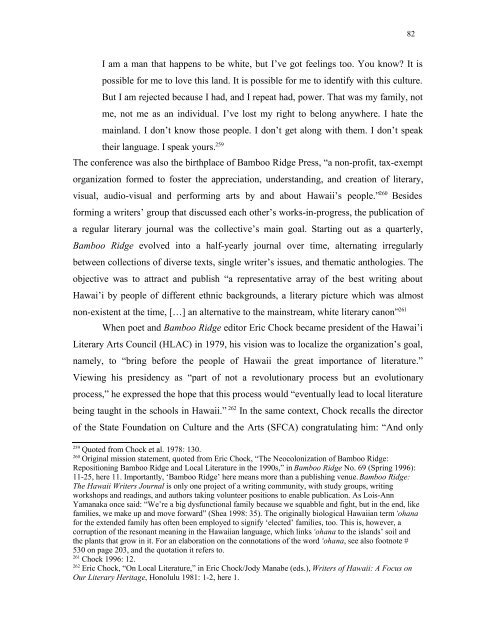A Paradise Lost - KOPS - Universität Konstanz
A Paradise Lost - KOPS - Universität Konstanz
A Paradise Lost - KOPS - Universität Konstanz
You also want an ePaper? Increase the reach of your titles
YUMPU automatically turns print PDFs into web optimized ePapers that Google loves.
I am a man that happens to be white, but I’ve got feelings too. You know? It is<br />
possible for me to love this land. It is possible for me to identify with this culture.<br />
But I am rejected because I had, and I repeat had, power. That was my family, not<br />
me, not me as an individual. I’ve lost my right to belong anywhere. I hate the<br />
mainland. I don’t know those people. I don’t get along with them. I don’t speak<br />
their language. I speak yours. 259<br />
The conference was also the birthplace of Bamboo Ridge Press, “a non-profit, tax-exempt<br />
organization formed to foster the appreciation, understanding, and creation of literary,<br />
visual, audio-visual and performing arts by and about Hawaii’s people.” 260 Besides<br />
forming a writers’ group that discussed each other’s works-in-progress, the publication of<br />
a regular literary journal was the collective’s main goal. Starting out as a quarterly,<br />
Bamboo Ridge evolved into a half-yearly journal over time, alternating irregularly<br />
between collections of diverse texts, single writer’s issues, and thematic anthologies. The<br />
objective was to attract and publish “a representative array of the best writing about<br />
Hawai’i by people of different ethnic backgrounds, a literary picture which was almost<br />
non-existent at the time, […] an alternative to the mainstream, white literary canon” 261<br />
When poet and Bamboo Ridge editor Eric Chock became president of the Hawai’i<br />
Literary Arts Council (HLAC) in 1979, his vision was to localize the organization’s goal,<br />
namely, to “bring before the people of Hawaii the great importance of literature.”<br />
Viewing his presidency as “part of not a revolutionary process but an evolutionary<br />
process,” he expressed the hope that this process would “eventually lead to local literature<br />
being taught in the schools in Hawaii.” 262 In the same context, Chock recalls the director<br />
of the State Foundation on Culture and the Arts (SFCA) congratulating him: “And only<br />
259 Quoted from Chock et al. 1978: 130.<br />
260 Original mission statement, quoted from Eric Chock, “The Neocolonization of Bamboo Ridge:<br />
Repositioning Bamboo Ridge and Local Literature in the 1990s,” in Bamboo Ridge No. 69 (Spring 1996):<br />
11-25, here 11. Importantly, ‘Bamboo Ridge’ here means more than a publishing venue. Bamboo Ridge:<br />
The Hawaii Writers Journal is only one project of a writing community, with study groups, writing<br />
workshops and readings, and authors taking volunteer positions to enable publication. As Lois-Ann<br />
Yamanaka once said: “We’re a big dysfunctional family because we squabble and fight, but in the end, like<br />
families, we make up and move forward” (Shea 1998: 35). The originally biological Hawaiian term ‘ohana<br />
for the extended family has often been employed to signify ‘elected’ families, too. This is, however, a<br />
corruption of the resonant meaning in the Hawaiian language, which links ‘ohana to the islands’ soil and<br />
the plants that grow in it. For an elaboration on the connotations of the word ‘ohana, see also footnote #<br />
530 on page 203, and the quotation it refers to.<br />
261 Chock 1996: 12.<br />
262 Eric Chock, “On Local Literature,” in Eric Chock/Jody Manabe (eds.), Writers of Hawaii: A Focus on<br />
Our Literary Heritage, Honolulu 1981: 1-2, here 1.<br />
82

















